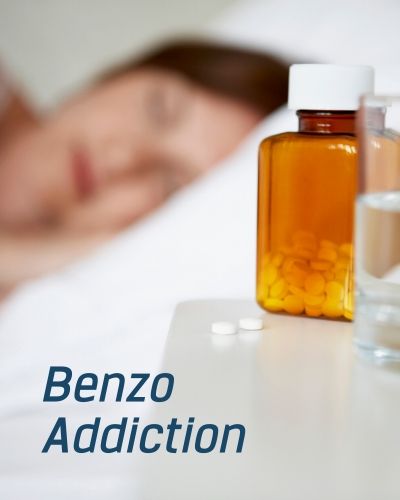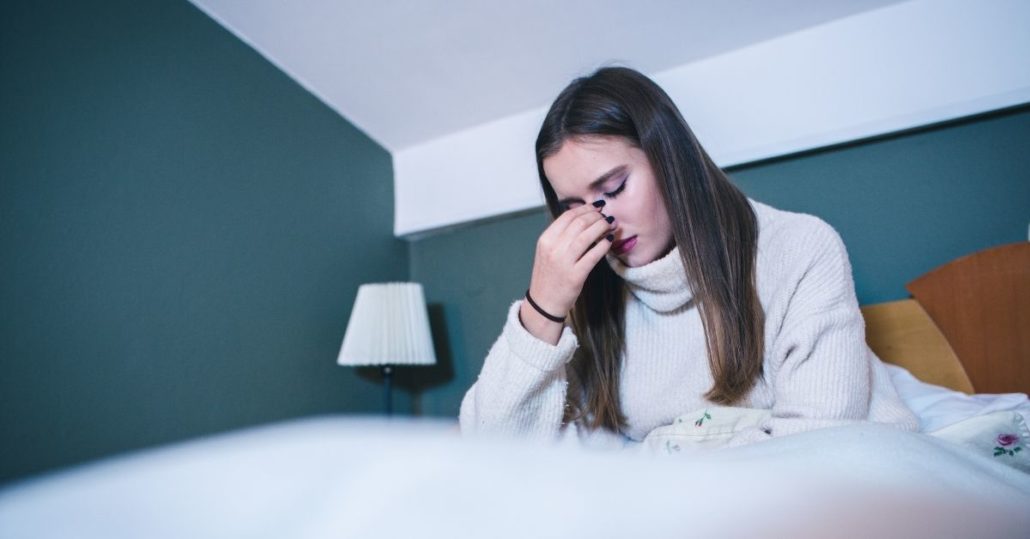What is Klonopin?
Klonopin has the generic name of Clonazepam. It is a benzodiazepine commonly used to treat various conditions, including anxiety disorders and epileptic seizures [1]. However, due to its low price and easy availability, it has become a widely misused medication, both in medical and recreational contexts.
Klonopin, alone or in combination with other psychoactive substances, can lead to unwanted effects on health, such as motor and cognitive impairment, sleep disorders, and aggravation of mood and anxiety disorders. In addition, prolonged use of Klonopin may lead to physical dependence and tolerance. Therefore, there is a need to find safer therapeutic alternatives for treating seizures and anxiety disorders.
Taking benzodiazepines like Klonopin, with alcohol, opioid medicines, or other central nervous systems (CNS) depressants (including street drugs) can cause breathing problems (respiratory depression), severe drowsiness, coma, and death.
There is a risk of abuse, misuse, and addiction with benzodiazepines, including Klonopin, leading to overdose and severe side effects, including coma and death. Someone can develop an addiction even if they take Klonopin as prescribed by a healthcare provider. Do not take this medication with other people and keep it in a safe place away from children.
Serious side effects including coma and death have happened in people who have abused or misused benzodiazepines, including Klonopin. These severe side effects may include paranoia, delirium, suicidal thoughts or actions, difficulty breathing, and seizures. Call your healthcare provider or go to the nearest hospital emergency room right away if you get any of these serious side effects.


Get Your Life Back
Find Hope & Recovery. Get Safe Comfortable Detox, Addiction Rehab & Mental Health Dual Diagnosis High-Quality Care at the We Level Up Treatment Centers Network.
Hotline (877) 378-4154Is Klonopin Dangerous?
On top of addiction, the most significant and immediate danger related to Klonopin is overdose from combining the drug with alcohol, opioids, or other substances. Both alcohol and marijuana can increase specific side effects, including lack of coordination, dizziness, and drowsiness, even when consumed in moderation. Impaired cognition and judgment, vertigo, and confusion can also occur. Drinking alcohol when taking Klonopin could also result in blacking out, respiratory failure, or even death.
Certain medications can also increase the risk of dangerous side effects. Since Klonopin is a central nervous system depressant, individuals taking other sedating medications – anti-anxiety medications, like sleeping pills, muscle relaxers, anticonvulsants, antidepressants, and opioids – are at greater risk. This includes over-the-counter and prescription drugs. As a result, it’s important to discuss all medications or supplements with your doctor before starting Klonopin.
Taking more Klonopin than a doctor prescribes also increases the risk of potentially dangerous side effects. Vertigo, dizziness, fainting, numbness, impaired judgment, confusion, slowed reaction time, and other issues may all occur. In a worthy-case scenario, taking too much Klonopin slows the heart and breathing rates to hazardous points, potentially leading to coma and even death.
Dangers of Klonopin Overdose
Even when benzodiazepine medications such as Klonopin are legitimately prescribed, overdose can still happen if the person accidentally takes too much. According to the National Institute on Drug Abuse (NIDA) [2], there has been a fivefold increase in the number of overdose deaths related to benzodiazepine consumption. However, Klonopin overdose is most likely when the medication is mixed with other intoxicating or addictive substances, especially alcohol.
Older adults are particularly at risk of overdosing on Xanax, Valium, or Klonopin because many of them also take other prescription medications, especially opioid painkillers. Individuals who are prescribed benzodiazepines should be careful of mixing these medications with opioid painkillers, barbiturates, and tricyclic antidepressants [3].
Symptoms of Klonopin Overdose
A standard dose of Klonopin is 0.5 mg. Ingesting too much can result in a Klonopin overdose. While symptoms of an overdose may vary from person to person, they primarily include extreme drowsiness or dizziness, confusion, slow reflexes, fainting, and muscle weakness. Reduced coordination, lowered attention span, memory impairment, and slurred speech are warning signs as well.

Slowed or labored breathing, as well as unresponsiveness and loss of consciousness, also indicate a serious overdose. Respiratory arrest is another sign of a serious Klonopin overdose, as the central nervous system is depressed to the point where the individual stops breathing.
If an overdose is suspected, it’s important to seek out medical attention immediately. Combining Klonopin with opioids, alcohol or other drugs can result in death if not treated quickly so it’s best to call 911 at the first signs of a possible Klonopin overdose.
Get Help. Get Better. Get Your Life Back.
Searching for Accredited Drug & Alcohol Rehab Centers Near You? Or Mental Health Support?
Even if you have failed previously, relapsed, or are in a difficult crisis, we stand ready to support you. Our trusted behavioral health specialists will not give up on you. Call us when you feel ready or want someone to speak to about therapy alternatives to change your life. Even if we cannot assist you, we will lead you wherever you can get support. There is no obligation. Call our hotline today.
FREE Addiction Hotline – Call 24/7Major Side Effects of Klonopin Abuse
Klonopin, like most Benzodiazepine work by altering electrical activity between the brain cells. For individuals with anxiety disorders, Klonopin can mean the difference between feeling frightened and feeling calm. However, major side effects can include:
- Birth defects
- Confusion
- Seizures
- Headache
- Accidental falls
- Hallucinations
- Insomnia
- Bruising easily
- Weak or shallow breathing
- Unusual heartbeat
- Painful or difficult urination
- Drowsiness
- Blurred vision
- Slurred speech
Behavioral Side Effects of Klonopin Abuse
Klonopin brings different side effects that affect users’ behavior, such as:
- Worry that other people can read one’s thoughts
- Visual, tactile or auditory hallucinations
- Irrational thoughts that others have control over one’s behavior
- Paranoia
- Inability to harness control over uncomfortable thoughts or behaviors
- Vivid nightmares
- Extreme mood swings
- Out-of-character behavior
- Emotional coldness toward others
- Unprovoked excitability
- Nervousness
- Unexplained rage and anger
- Emotional numbness
- Suicidal thoughts
- Inability to feel pleasure
Other Side Effects of Klonopin Abuse
Sleep Disorder
Individuals who abuse Klonopin may feel excessively fatigued and unable to keep up with daily life. They might be struggling with a sleep disorder like insomnia that keeps them up all night, tossing and turning. Also, it’s difficult to keep their eyes open during daylight hours.
Other Klonopin abusers are tired no matter how much sleep they get—fatigue troubles not only the mind but also the body. Klonopin has also been connected with joint stiffness and muscle fatigue.
Moods
Klonopin dependency and abuse can also cause:
- Feelings of loss or sorrow
- Lack of interest in activities once enjoyed
- Anxiousness
- Depression
- Depersonalization
- Memory loss
The Anxiety and Depression Association of America reports 18 percent of American adults are tormented with anxiety disorders, and many of those people seek relief from anti-anxiety drugs like Klonopin. Ironically, anxiety is a common side effect of abusing Klonopin — a drug that is mainly prescribed for the treatment of the very same symptom. In addition, some people may feel depressed and lack any kind of sympathy or compassion toward others.
Depersonalization can happen with abuse and make someone feel like they aren’t connected to their own bodies. Similarly, both short-term and long-term memory can be seriously damaged, and some individuals have failed to show progress in this department even after medical detox.
Cardiac Effects
Heart palpitations are among the last things any anxious individual wants to undergo, but they’re quite common when withdrawing from Klonopin. Moderate exercise and breathing practices may relieve some of the tension that builds with heart palpitations.
First-class Facilities & Amenities
World-class High-Quality Addiction & Mental Health Rehabilitation Treatment
Rehab Centers TourRenowned Addiction Centers. Serene Private Facilities. Inpatient rehab programs vary.
Addiction Helpline (877) 378-4154Proven recovery success experience, backed by a Team w/ History of:
15+
Years of Unified Experience
100s
5-Star Reviews Across Our Centers
10K
Recovery Success Stories Across Our Network
- Low Patient to Therapist Ratio
- Onsite Medical Detox Center
- Comprehensive Dual-Diagnosis Treatment
- Complimentary Family & Alumni Programs
- Coaching, Recovery & Personal Development Events
Is Klonopin Dangerous and can it cause stomach problems?
With a Klonopin drug dependence, if a benzodiazepine drug use is stopped, the body must adjust to not having the prescription drug present all the time. This adjustment process is what creates uncomfortable symptoms in the stomach, or benzo belly.
For most drugs and substances, withdrawal symptoms last one or two weeks after taking the last dose. Benzodiazepines such as Klonopin, are known for having long post-acute withdrawal symptoms (PAWS), or protracted withdrawal.
“Benzo belly” itself normally starts in the protracted withdrawal phase. It may persist for several weeks after the last dose of the drug, symptoms normally get better with time, but may last a year or more for some individuals.
Symptoms of Benzo Belly
“Benzo belly” symptoms may include alternating constipation and diarrhea. The condition is usually made worse by specific foods. Some claim that one’s diet or certain foods help ease symptoms, which probably varies from person to person.
Examples of other symptoms of “Benzo belly” include:
- Abdominal Pain
- Diarrhea
- Appetite Changes
- Constipation
- Lower abdominal pain
Individuals whose doctor prescribes Klonopin should discuss discontinuing the medication if they have been using it for more than four weeks. Evidence shows that benzodiazepines, such as Klonopin are not effective following this period, and continued use only increases the chances of addiction.

Is There a Benzo Belly Remedy?
In general, no; individuals withdrawing from benzodiazepine must wait for symptoms to go away. However, some people may find some relief by changing their diet.
Symptoms are sometimes made more harmful by certain foods. For example, many people with “benzo belly” mistakenly become convinced they have developed a new food allergy when they are actually experiencing withdrawal symptoms.
Individuals using a benzodiazepine medication chronically should talk to their doctor about tapering off the drug. A slow taper is usually the best option to help prevent withdrawal symptoms.
Individuals who use Klonopinv for longer than four to six weeks are at the greatest risk of developing a tolerance that leads to addiction.
Is Klonopin dangerous, and can it cause depression?
One of the short-term side effects of low-to-moderate doses of any benzodiazepine, including Klonopin, is depression. Symptoms may form as the drug is metabolized out of your body, or they may occur at the drug’s peak effects on your brain since it is a sedative. If you take this medication for more than a couple of weeks or abuse it for nonmedical reasons, the drug can build up in your body. Side effects from the slower release of these drugs from body tissues can lead to depression-like symptoms, especially during detox or withdrawal.
The link between Klonopin and depression
So how does Klonopin cause depression? The connection between depression and Klonopin use can be understood through the mechanisms in the brain after the substance is ingested.
Once inside the body, Klonopin increases the overall function of gamma-aminobutyric acid (GABA), a chemical in the brain that produces relaxation. Therefore, the existence of the drug makes a user feel even more relaxed than is usually inherently possible. However, since Klonopin functions in the brain, it has more tremendous potential to ignite mental and emotional side effects, especially in a person with an undiagnosed mental condition or history of depression.
Whether a person is prescribed Klonopin or has become addicted on their own, the diagnosis of any underlying mental health condition is crucial in averting dangerous emotional changes and depressive symptoms.
Klonopin misuse also comes with warnings of withdrawal symptoms. These symptoms include seizures, mental instability, shaking, mood changes, stomach cramps, and muscle stiffness. To help prevent withdrawal, the person is advised to talk with their doctor before stopping completely, and the doctor will lower the person’s dose slowly to prevent withdrawal symptoms.
World-class, Accredited, 5-Star Reviewed, Effective Addiction & Mental Health Programs. Complete Behavioral Health Inpatient Rehab, Detox plus Co-occuring Disorders Therapy.
CALL (877) 378-4154End the Addiction Pain. End the Emotional Rollercoaster. Get Your Life Back. Start Drug, Alcohol & Dual Diagnosis Mental Health Treatment Now. Get Free No-obligation Guidance by Substance Abuse Specialists Who Understand Addiction & Mental Health Recovery & Know How to Help.
Is Klonopin Dangerous and does it make you sleepy?
If individuals suffer from insomnia, they may have been prescribed Klonopin for sleep. Klonopin is used in treating mental health issues like panic disorders, seizures caused by epilepsy, and involuntary muscle spasms. In some cases, it’s also used to treat restless legs syndrome.
In addition to the Klonopin uses described above, a person might have been prescribed Klonopin as an effective treatment for REM sleep disorders, including night terrors.
Klonopin for sleep relieves symptoms in people with no signs of Klonopin tolerance or abuse when dosages are carefully determined and monitored.
The behavioral side effects of Klonopin for sleep
According to the National Institute of Health (NIH) [4], Klonopin can affect behavior and mood.
Mental and behavioral side effects include paranoia, hallucinations, nightmares, excitement, unexplained rage, irrational thoughts, and suicidal thoughts.
The side effects that can affect our mood include anxiousness, depression, loss of memory, feelings of loss, feelings of sorrow, mood swings, and lack of interest in activities that we once found enjoyable.
The physical side effects of Klonopin for sleep
Klonopin studies show that 30% of people taking the medication experience ataxia. Ataxia is a loss of balance or problems coordinating our body movements.
Other physical side effects might include seizures, accidental falls, weak or shallow breathing, or an unusual heartbeat.
Adverse effects that Klonopin can produce include painful or difficult urination, chronic insomnia or sleepiness, blurred vision, headache, and slurred speech.
Some additional potential physical side effects from Klonopin include fluctuations in your weight, loss of appetite, diarrhea, pain, and inflammation, sweating, nausea, and fever.
If you stop taking Klonopin, you may experience heart palpitations. Consult with your doctor regarding these or other effects you may experience.
Find the Right Treatment at We Level Up NJ

Many people started using Klonopin for a legitimate reason — to treat anxiety. As a result, they fear their paranoid and anxious symptoms will return if they stop using it; however, substance abuse can worsen pre-existing anxiety. This type of substance abuse can severely boost the symptoms of mental health disorders and make them quite challenging to treat. Others may suffer from substance-induced psychotic disorders when abusing this type of drug. Now that we’ve answered the question, is Klonopin dangerous? It is essential to ask ourselves, are we addicted to this drug?
Addiction to Klonopin can leave you feeling isolated and alone, but help is available. We Level Up NJ provide proper care with round-the-clock medical staff to assist your recovery. So, reclaim your life, call us to speak with one of our treatment specialists. Our counselors know what you are going through and will answer any of your questions.
Experience Transformative Recovery at the We Level Up Treatment Center.
See our authentic success stories. Get inspired. Get the help you deserve.



Start a New Life
Begin with a free call to an addiction & behavioral health treatment advisor. Learn more about our dual-diagnosis programs. The We Level Up treatment center network delivers various recovery programs at each treatment facility. Call to learn more.
- Personalized Care
- Caring Accountable Staff
- World-class Amenities
- Licensed & Accredited
- Renowned w/ 5-Star Reviews
We’ll Call You
Sources:
[1] NIH – https://dailymed.nlm.nih.gov/dailymed/drugInfo.cfm?setid=542f22e8-dad2-47a8-93b6-30936715d73b
[2] NIDA – https://www.drugabuse.gov/drug-topics/opioids/benzodiazepines-opioids
[3] SAMHSA – https://www.samhsa.gov/data/sites/default/files/DAWN-SR192-BenzoCombos-2014/DAWN-SR192-BenzoCombos-2014.pdf
[4] NIMH – https://clinicaltrials.gov/ct2/show/NCT00031317